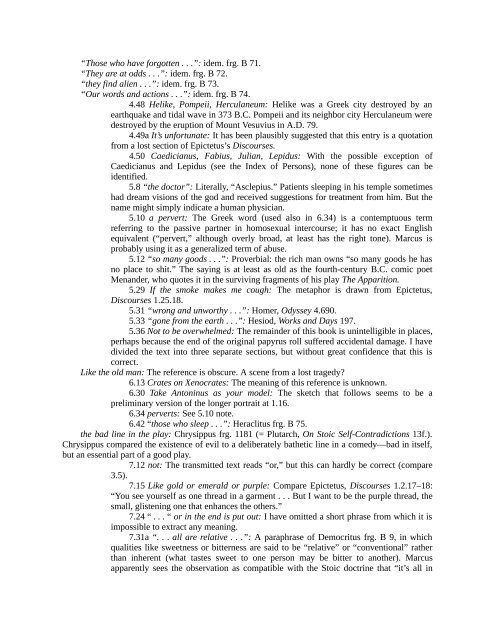9781945186240
Create successful ePaper yourself
Turn your PDF publications into a flip-book with our unique Google optimized e-Paper software.
“Those who have forgotten . . .”:: idem. frg. B 71.<br />
“They are at odds . . .”:: idem. frg. B 72.<br />
“they find alien . . .”:: idem. frg. B 73.<br />
“Our words and actions . . .”:: idem. frg. B 74.<br />
4.48 Helike, Pompeii, Herculaneum:: Helike was a Greek city destroyed by an<br />
earthquake and tidal wave in 373 B.C. Pompeii and its neighbor city Herculaneum were<br />
destroyed by the eruption of Mount Vesuvius in A.D. 79.<br />
4.49a It’s unfortunate:: It has been plausibly suggested that this entry is a quotation<br />
from a lost section of Epictetus’s Discourses.<br />
4.50 Caedicianus, Fabius, Julian, Lepidus:: With the possible exception of<br />
Caedicianus and Lepidus (see the Index of Persons), none of these figures can be<br />
identified.<br />
5.8 “the doctor”:: Literally, “Asclepius.” Patients sleeping in his temple sometimes<br />
had dream visions of the god and received suggestions for treatment from him. But the<br />
name might simply indicate a human physician.<br />
5.10 a pervert:: The Greek word (used also in 6.34) is a contemptuous term<br />
referring to the passive partner in homosexual intercourse; it has no exact English<br />
equivalent (“pervert,” although overly broad, at least has the right tone). Marcus is<br />
probably using it as a generalized term of abuse.<br />
5.12 “so many goods . . .”:: Proverbial: the rich man owns “so many goods he has<br />
no place to shit.” The saying is at least as old as the fourth-century B.C. comic poet<br />
Menander, who quotes it in the surviving fragments of his play The Apparition.<br />
5.29 If the smoke makes me cough:: The metaphor is drawn from Epictetus,<br />
Discourses 1.25.18.<br />
5.31 “wrong and unworthy . . .”:: Homer, Odyssey 4.690.<br />
5.33 “gone from the earth . . .”:: Hesiod, Works and Days 197.<br />
5.36 Not to be overwhelmed:: The remainder of this book is unintelligible in places,<br />
perhaps because the end of the original papyrus roll suffered accidental damage. I have<br />
divided the text into three separate sections, but without great confidence that this is<br />
correct.<br />
Like the old man:: The reference is obscure. A scene from a lost tragedy?<br />
6.13 Crates on Xenocrates:: The meaning of this reference is unknown.<br />
6.30 Take Antoninus as your model:: The sketch that follows seems to be a<br />
preliminary version of the longer portrait at 1.16.<br />
6.34 perverts:: See 5.10 note.<br />
6.42 “those who sleep . . .”:: Heraclitus frg. B 75.<br />
the bad line in the play:: Chrysippus frg. 1181 (= Plutarch, On Stoic Self-Contradictions 13f.).<br />
Chrysippus compared the existence of evil to a deliberately bathetic line in a comedy—bad in itself,<br />
but an essential part of a good play.<br />
7.12 not:: The transmitted text reads “or,” but this can hardly be correct (compare<br />
3.5).<br />
7.15 Like gold or emerald or purple:: Compare Epictetus, Discourses 1.2.17–18:<br />
“You see yourself as one thread in a garment . . . But I want to be the purple thread, the<br />
small, glistening one that enhances the others.”<br />
7.24 “ . . . “ or in the end is put out:: I have omitted a short phrase from which it is<br />
impossible to extract any meaning.<br />
7.31a “. . . all are relative . . .”:: A paraphrase of Democritus frg. B 9, in which<br />
qualities like sweetness or bitterness are said to be “relative” or “conventional” rather<br />
than inherent (what tastes sweet to one person may be bitter to another). Marcus<br />
apparently sees the observation as compatible with the Stoic doctrine that “it’s all in


